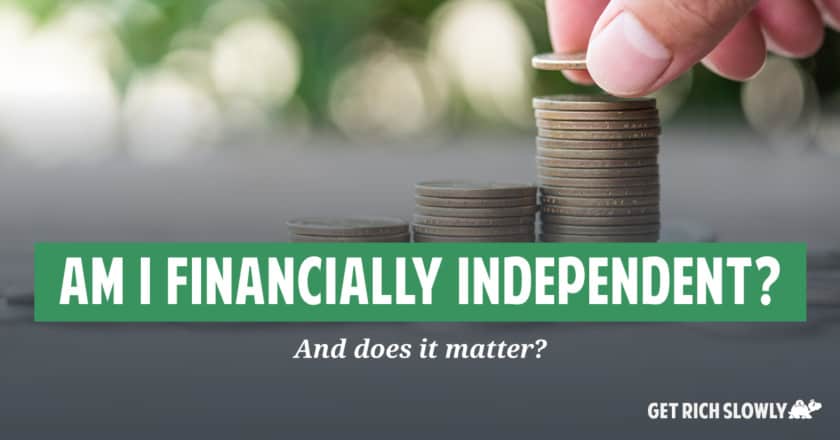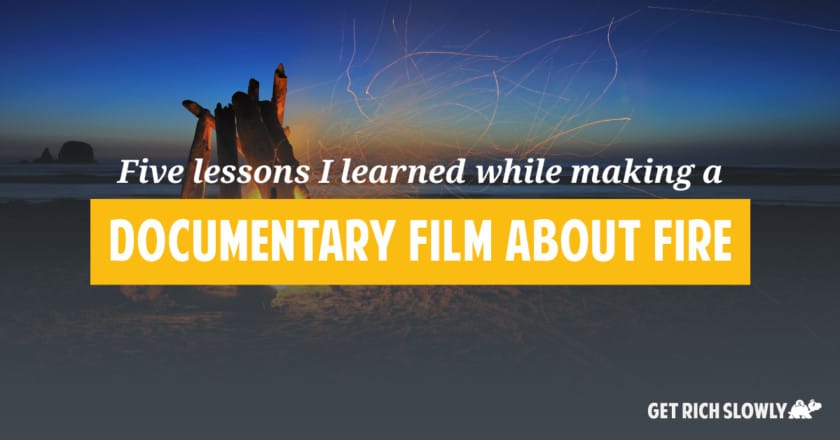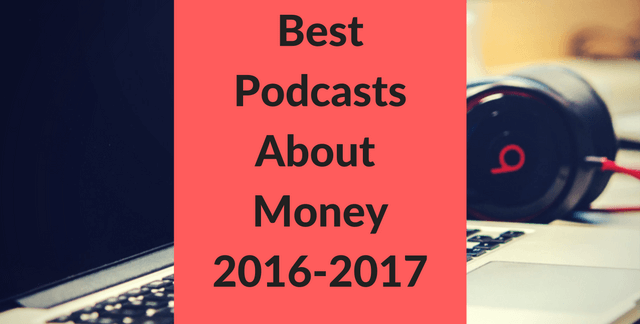Am I financially independent? (And does it matter?)

It's been two years since I last looked at my overall financial situation to determine whether I have the resources to meet my goals. In those two years, much has changed.
I sold my condo and bought a home in the country. I repurchased Get Rich Slowly. I invested in not one but three other businesses. The stock market has bounced around, I've begun part-time work at the family business, and I've made many other minor adjustments to my daily life.
With all of these fluctuations, I'm naturally left to wonder: Am I still financially independent?
Five lessons I learned while making a documentary film about FIRE

When J.D. decided to spend three weeks in Europe with his family, he asked a few people if they'd be interested in contributing articles during his absence. He even asked me!
My name is Scott Rieckens, and I'm new to the world of smart money management. I'm new to the world of financial independence and early retirement. I'm new, but I've totally immersed myself in it. I've immersed myself so much, in fact, that I've spent the past eighteen months creating a feature film about FIRE. (FIRE is the clumsy abbreviation for "financial independence/retire early". Basically, the FIRE movement is all about saving big so that you can choose to live however you want.)
"You've been in a unique position over the past year," J.D. said when I asked him what I should write about. "You've had amazing access to a variety of people who think and write and teach about financial independence and early retirement. You've been able to hear what they think and say in private as well as public. What about sharing your biggest takeaways from this experience?"
The thin green line: Why you should be skeptical of financial blogs

- Blogging has become more business-like and less personal. A decade ago, most blogs -- even money blogs -- were rooted in the author's individual experience. Nowadays, most big financial blogs have a minimal editorial voice. They're much like money magazines used to be.
- Audience interaction is limited. In the mid-2000s, it wasn't unusual for blog articles to get dozens (or hundreds) of comments. This site has old articles with over 1000 comments. Nowadays, many blogs have removed reader comments...because they receive so few reader comments. And when blogs do allow comments (as here at GRS), they're scarcer than they used to be.
- Today, most bloggers want to make money. In fact, that's their primary goal. When I started blogging in 1997, there was no way to make money from it. When I launched this site in 2006, my primary goal was to get out of debt. My secondary goal was to help others get out of debt. Yes, I wanted to make money -- but that was only my third aim. It was almost an after-thought. (This was, in part, because it was more difficult to make money blogging in 2006.)
Most of the changes in the world of blogging are neutral. They're neither good nor bad. They just are. But I think the move to a more money-centric approach often does a disservice to readers -- to people like you.
How I Became a Blogging Cynic
Twelve years ago, if I read something on a financial blog, I generally accepted it at face value. If somebody recommended a book, I trusted their sincerity. If they wrote about the best bank accounts, I believed they were telling me about the best bank accounts. If they raved about a company or service they liked, I had no reason to doubt them.
The best podcasts, audiobooks, and digital courses about personal finance and financial independence
Last week at the Financial Independence forum on Reddit, a user asked for podcast and audiobook recommendations related to personal finance, financial independence, and self-improvement. Livealegacy wrote:
I have about two hours a day that I spend driving and I'm looking to invest this time in myself...I'm looking for everyone's favorite investing/PF podcast or audiobooks. Might as well get smarter every day so if you have others you recommend outside of FI, this is about investing in myself so please share.
As an audio junkie myself -- I like to listen while I exercise or, sometimes, as I'm falling asleep -- I thought it would be useful to catalog all of this info in one place. There's a lot here. Let's get started!
A primer on finding unclaimed property
Finding free money lying around with your name on it seems a little too good to be true, doesn't it?
 That's what I thought when I learned about Missing Money, a website that offers to help you track down unclaimed property that may belong to you. Sometimes free money is for real, though. The site is legit and exactly what it claims: a tool for finding free money. Specifically, money that's already yours that you may have forgotten about or lost track of.
That's what I thought when I learned about Missing Money, a website that offers to help you track down unclaimed property that may belong to you. Sometimes free money is for real, though. The site is legit and exactly what it claims: a tool for finding free money. Specifically, money that's already yours that you may have forgotten about or lost track of.
What is Unclaimed Property?
Unclaimed property is any financial asset that has been abandoned for a period of time. That time might be as little as one year or as much as three, depending on the state you live in. If the financial institution or company holding your money loses contact with you and can't locate you within a certain period of time, they have to turn your assets over to the state. According to Missing Money, some common types of unclaimed property include:
Best non-U.S. personal finance sites?
People are the same all around the world. Everyone struggles with the same things — including money. Because of this, financial advice from one country is generally applicable to other countries, as well. Sort of.
While general advice is easy to transfer from one culture to another, the specifics are often lost in translation. In the U.S., we have a Roth IRA. But in Canada, they have an RRSP. And in the U.K.? Well, I'm not sure.
Nicola lives in the U.K., and she recently wrote to express her frustration, and to ask for advice. She says: Continue reading...
Good-bye, Microsoft Money! 12 powerful personal finance programs

Microsoft Money is no longer available for purchase. Microsoft has essentially conceded that there's no demand for the personal finance software product. From the website:
With banks, brokerage firms and websites now providing a range of options for managing personal finances, the consumer need for Microsoft Money Plus has changed. After suspending annual updates of Money Plus in 2008, Microsoft is announcing today that we will no longer offer Microsoft Money Plus for purchase after June 30, 2009.
Now that Microsoft has thrown in the towel, where does that leave existing users of Money and Money Plus? Some of them are worried. I've received several e-mails about this recently, including this one from Lee G.: "Microsoft just left us in a lurch by killing Money. Any suggestions on finance software? I'm not really a fan of Quicken, but would entertain it."
Best personal finance podcasts

Podcasts are a great and free way to learn about saving and investing. Here are some of the very best personal finance podcasts we feel are worthy of your "must-listen" line-up:
Planet Money
Planet Money is perhaps the best all-around podcast about money and economics out there right now. The production values are extremely high -- as you'd expect from any NPR show -- but it stands out for its ability to explain the most complex economic issues in straightforward and innovative ways. Their most famous episode, "Giant Pool of Money" with This American Life, remains one of the best pieces of explanatory journalism on the housing crisis in any medium. If you still aren't certain what caused the housing crisis of 2008 and the global money panic that followed definitely give this episode a listen.
Bad With Money
If you don't know a stock from a bond or an IRA from the IRS, you may want to check out Bad With Money with YouTube comedian and former BuzzFeed writer Gaby Dunn. While primarily geared toward millennials, this podcast is a sonic kick-in-the-pants for anyone who needs to get a handle on their money management (or lack thereof.) One of the better episodes allowed listeners to come along as Gaby unloaded all her financial baggage to a financial psychologist. Yes, your parents' attitudes about money are likely affecting you today. This is not the place for advice on sophisticated financial instruments or advanced savings and investing -- by any means -- but Gaby's voice is fresh and the tone 100 percent non-judgmental.
Missing money: Finding unclaimed property
On Monday, I received a strange letter in the mail. It was addressed to my father, but sent to my home. My father has been dead for twelve years, and he never saw the house we live in now. The letter purports to be a settlement of some sort of $400 annuity. (I'm unclear on the details and don't have it with me right now.)
Though I'm deeply skeptical that this is anything but a scam, I do intend to follow up in case it's legitimate. I've heard stories of people who have "found" money of this sort. In fact, there's an entire industry devoted to lost and unclaimed money of all kinds.
In the U.S., the National Association of Unclaimed Property Administrators (NAUPA) is a non-profit organization that assists in "reuniting owners with their property". NAUPA sponsors a free site called Missing Money, which allows users to search unclaimed property records from participating states. In this context, "property" simply means "stuff" — it doesn't refer to real estate. Common types of unclaimed property include: Continue reading...